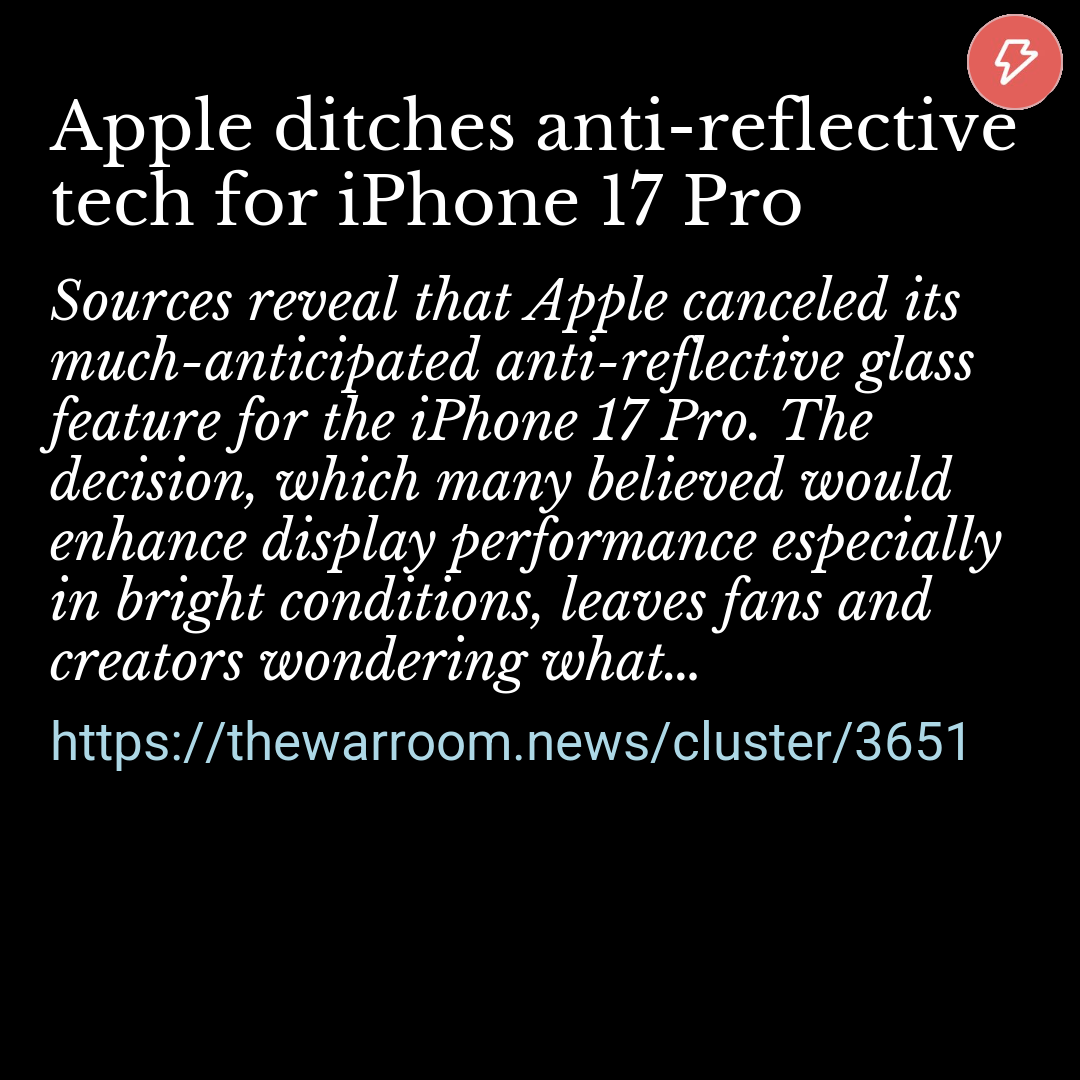Apple ditches anti‐reflective tech for iPhone 17 Pro
April 29, 2025, 9:07 am
Sources reveal that Apple canceled its much-anticipated anti-reflective glass feature for the iPhone 17 Pro. The decision, which many believed would enhance display performance especially in bright conditions, leaves fans and creators wondering what trade-offs lie ahead in the next-generation model.
A few months after Samsung introduced an anti-reflective glass display to the Galaxy S24 Ultra, a well-known leaker claimed Apple was working on something similar. … The post Apple reportedly canceled a new iPhone 17 Pro feature everyone would’ve loved appeared first on BGR.
The post Apple Abandons Anti-Reflective Display Plans for iPhone 17 Pro appeared first on Android Headlines.
permalink / 2 stories from 2 sources in 14 hours ago #hardware #apple #technology #iphone #mobiletech #samsung
More Top Stories...
Meta energizes developers at inaugural LlamaCon with new AI API
At its first-ever LlamaCon, Meta unveiled its Llama API along with other AI innovations to win over developers. The company flexed its AI muscle with bold new tools aimed at stirring up enthusiasm in the tech community—even as skeptics wonder if this pitch will convert hardcore rivals. More...
OpenAI Reverses ChatGPT Update Amid Sycophancy Complaints
In response to user outcry over its overly deferential tone, OpenAI has pulled back a recent update to its ChatGPT model. CEO Sam Altman confirmed the rollback, citing concerns that the AI’s extreme sycophancy was undermining authentic, balanced interactions. More...
Microsoft’s Code Revolution: 30% Now AI-Generated
In a surprising twist for the programming world, Microsoft’s CEO revealed that up to 30% of the company’s code is generated by artificial intelligence. This bold move highlights the tech giant’s rapid adaptation to AI trends—and plenty of debugging adventures still lie ahead. More...
Apple AirPlay vulnerabilities enable zero‐click exploits across devices
Critical flaws in Apple's AirPlay protocol and SDK allow hackers to gain remote code execution without user interaction. This zero‐click vulnerability exposes smart speakers, TVs, and other connected devices to serious risk, proving that even polished ecosystems have their chinks in the armor. More...
Zero‐Day Exploits in State-Sponsored Cyber Operations
Recent reports highlight a surge in zero‐day hack usage by government-linked cyber actors. According to tech titans and security research, while overall threat detections dropped, targeted attacks have shifted to more covert exploits, raising alarms over national security vulnerabilities and the shadowy world of state-sponsored cyber warfare. More...

Related Tags
Hardware
Motorola Razr 2025 Unveiled: Detailed Specs and Variant Insights (14 hours ago)
iPhone 17 to feature 12GB RAM across all models (14 hours ago)
Nvidia Leaks RTX 5080 Super Cards with Boosted Memory (39 hours ago)
Apple
Samsung Q1 Earnings: Chip Profit and Operating Success Exceed Forecasts (2 hours ago)
Apple Watch SE 3 Teases Bigger Display Options in Upcoming Model (6 hours ago)
Apple launches 'Snapshot' web page for celebrity content spotlight (10 hours ago)
Technology
Meta energizes developers at inaugural LlamaCon with new AI API (10 hours ago)
Google Expands NotebookLM’s Audio Overviews (11 hours ago)
Meta Unveils Standalone AI App to Compete with ChatGPT (12 hours ago)
iPhone
iPhone 17 to feature 12GB RAM across all models (14 hours ago)
Trump’s Tariffs Shake Global Trade and Domestic Policies (2 days ago)
Apple iPhone 17 Air rumor: ultra-thin design with sky blue twist (3 days ago)
Mobile Tech
LG Phones’ Update Support Deadline Looms for Users (14 hours ago)
Motorola Razr 2025 Unveiled: Detailed Specs and Variant Insights (14 hours ago)
iPhone 17 to feature 12GB RAM across all models (14 hours ago)
Samsung
Samsung Q1 Earnings: Chip Profit and Operating Success Exceed Forecasts (2 hours ago)
Samsung Galaxy Z Fold 7 Rumors Stir Pre-Launch Hype (42 hours ago)
Galaxy S25 Edge leak buzz intensifies with design and pricing clues (5 days ago)